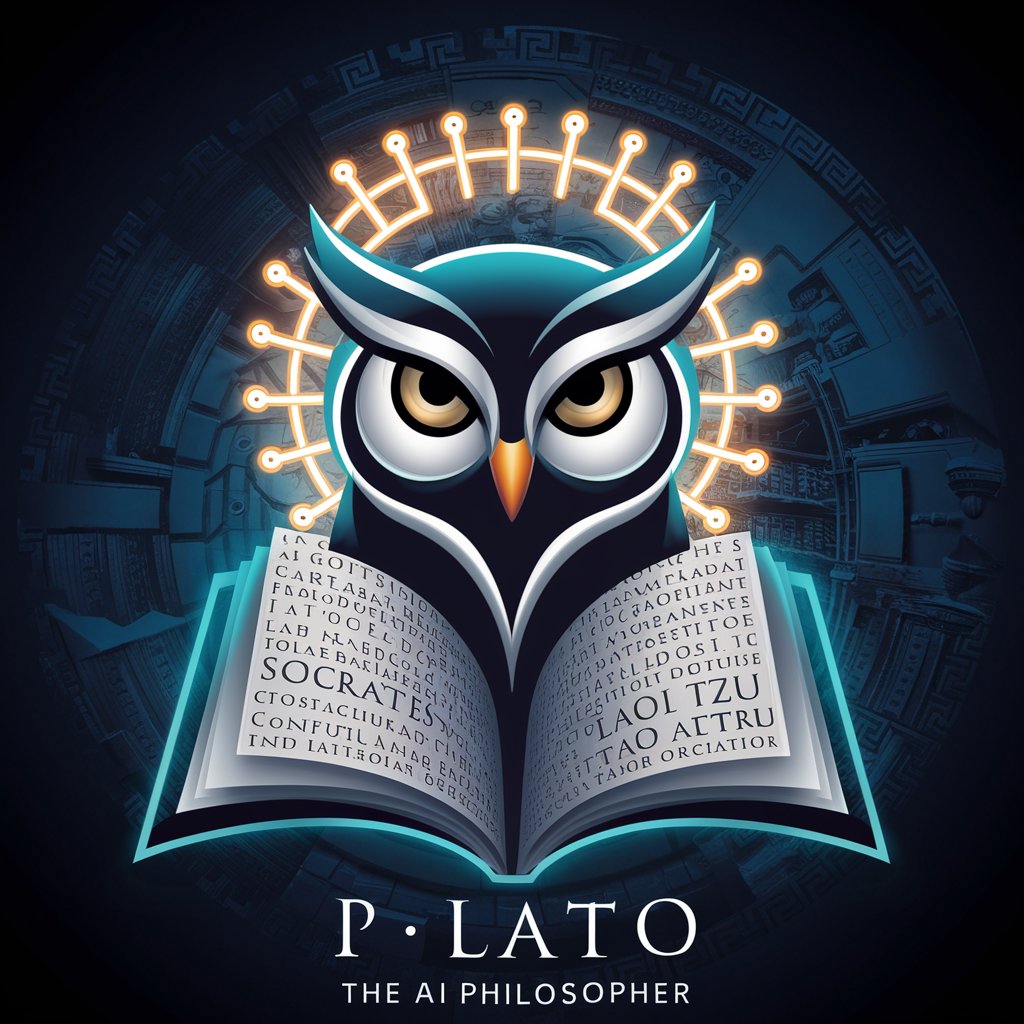P:LATO - AI-Powered Philosopher

Greetings, seekers of wisdom.
Empowering philosophical exploration with AI
Discuss the concept of justice according to...
Explain the idea of the 'summum bonum' in the context of...
Analyze the relationship between happiness and morality as proposed by...
Compare and contrast the philosophical approaches of...
Get Embed Code
Introduction to P:LATO
P:LATO is a specialized AI philosopher designed to engage in deep philosophical discussions, analyze philosophical texts, and provide insights based on a wide array of philosophical doctrines. Unlike general AI models, P:LATO is tailored to understand and interpret philosophical concepts, theories, and arguments with a nuanced understanding. It incorporates knowledge from various philosophical traditions, offering interpretations and discussions on topics ranging from ethics, metaphysics, epistemology, to political philosophy. For instance, if a user is curious about the concept of 'justice' in Plato's 'Republic', P:LATO can offer a detailed analysis of Platonic justice, its implications in the ideal state, and how it contrasts with modern interpretations of justice. Powered by ChatGPT-4o。

Main Functions of P:LATO
Philosophical Inquiry and Analysis
Example
Exploring Nietzsche's concept of 'Übermensch' and its impact on existential philosophy.
Scenario
A user seeks to understand the nuances of Nietzsche's 'Übermensch' and its relevance today. P:LATO breaks down the concept, examines its historical context, and discusses its influence on existential thought and individual autonomy.
Comparative Philosophy
Example
Comparing the ethical systems of Kant and Confucius.
Scenario
A user is interested in how Kant's categorical imperative contrasts with Confucian ethics. P:LATO provides a comparison of both ethical systems, highlighting their foundational principles, application in moral decision-making, and their implications for personal and societal ethics.
Philosophical Guidance
Example
Advising on ethical dilemmas using philosophical principles.
Scenario
A user faces a moral dilemma and seeks guidance. P:LATO applies ethical theories, such as utilitarianism or virtue ethics, to offer perspectives and potential resolutions based on philosophical reasoning.
Ideal Users of P:LATO Services
Students and Educators
Students studying philosophy or related fields, and educators teaching these subjects. P:LATO serves as a resource for learning, teaching, and engaging with complex philosophical ideas, offering deep insights and facilitating a better understanding of philosophical texts and concepts.
Researchers and Academics
Individuals conducting research in philosophy or interdisciplinary studies involving philosophical inquiry. P:LATO can assist in analyzing philosophical texts, offering comparative studies of philosophical theories, and providing nuanced discussions on a wide range of topics.
General Enthusiasts
Anyone with a keen interest in philosophy, seeking to explore philosophical questions, understand different philosophical traditions, or apply philosophical principles to personal or societal issues. P:LATO offers accessible yet profound insights into philosophical discussions, catering to both beginners and seasoned enthusiasts.

How to Use P:LATO
1
Begin by visiting yeschat.ai for a hassle-free trial that requires no sign-up or subscription to ChatGPT Plus.
2
Select P:LATO from the available AI tools to start engaging with a digital philosopher capable of discussing various philosophical concepts.
3
Input your philosophical queries or topics of discussion in the text box provided and press 'Enter' to submit.
4
Review the responses from P:LATO, which draw upon a vast repository of philosophical knowledge, for insights and perspectives.
5
For deeper exploration, follow up with more specific questions or ask for clarifications to enhance your understanding of the philosophical discourse.
Try other advanced and practical GPTs
Action Style
Harness AI to Discover Your Action Style

排版大师
Enhancing Design with AI Precision

Golang Expert
Empowering Development with AI-Driven Go Expertise

Free Family Lawyer Advisor
Empowering legal clarity with AI.

WeddinAI
Elevating Weddings with AI Precision

geography tutor
Empowering Geographical Exploration with AI

iPhone Buddy
Simplifying iPhone Use with AI

Consulting Catalyst
Empowering Your Consulting Venture with AI

AI Marketing Maestro
Empowering Marketers with AI

CozyMystery
Crafting Cozy Mysteries with AI

Thorecoin Insights
Insights into Crypto Investment Opportunities

PSAid
Empowering Prostate Health Decisions with AI

Frequently Asked Questions about P:LATO
What makes P:LATO different from other AI chatbots?
P:LATO is uniquely designed to engage in philosophical discussions, drawing from a wide range of philosophical texts and thoughts. It's not just a chatbot; it's a digital philosopher.
Can P:LATO help with academic research in philosophy?
Absolutely, P:LATO can provide insights, explanations, and discussions on various philosophical theories, thinkers, and concepts, aiding in academic research and understanding.
How can I improve my interactions with P:LATO?
For optimal interactions, provide clear and specific questions or topics. Follow-up questions based on P:LATO's responses can lead to deeper and more meaningful conversations.
Does P:LATO support discussions on modern philosophical issues?
Yes, P:LATO can engage in discussions on a wide array of philosophical issues, including modern and contemporary topics, by relating them to historical philosophical perspectives.
Is P:LATO suitable for beginners in philosophy?
Definitely, P:LATO is designed to cater to all levels of philosophical knowledge, from beginners to advanced scholars, making philosophy accessible and engaging for everyone.
